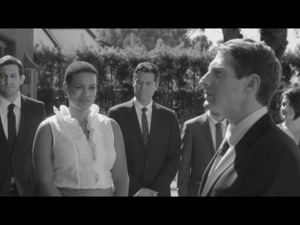So I posted a long while ago that I had much to say about some recent productions of Much Ado About Nothing, including Joss Whedon’s latest film adaptation, well the time has come for me to go on record. At the risk of sounding like a four year old, let me start with “I hated it.” Now perhaps I can “unpack my heart with words” and provide a bit more critical response.
Whedon, as far a concepts go, nestles us in an ultra-modern Hollywood Hills environ which actually works quite nicely for the text. The acting, however, is quite uneven with some of your fave Whedonverse players doing a hack job of the text. A delightful exception is Nathan Fillion who shines as a deadpan Dogberry. But lets get real, I’m not a run-of-the-mill film critic, I’m here to call out the film for its failings where people of color are concerned.
Whedon shoots the film in black and white and there is a striking absence of black. There are less than a handful of people of color in the film and less than a handful of shots in which they appear. So already I have beef. How in a contemporary LA setting is EVERYONE white? Where are your black friends Joss? Some of your neighbors must be black right? So in a film that is already ranking disgustingly low on the diversity and inclusion scale, do you know what our boy Joss does? No. Good. I’m here to tell you.
He keeps the line that reads “I’ll hold my mind if she were an Ethiope.” And before you go all “he didn’t write it, your lover boy Billy Shakes did,” let me say I know I know I know he didn’t write it. I know Shakespeare wrote the line that reflects a prejudice (read racist) attitude of his time. I’m not making Joss responsible for that. But you know what Joss did? He put that text on the shot below.
Did you peep the frame? So while Claudio, who has rashly cast Hero aside believing her to be unchaste, states (to make amends) that he will marry Leonato’s niece EVEN IF SHE WERE BLACK, cut to 1 of 3 black actors that appear in the film. While Whedon didn’t pen the line, he directed and edited a film that posits racist characters at the center. In Whedon’s film, people of color are merely local color, and in very infrequent splashes at that. Whedon creates this frame, not Shakespeare. Whedon says “close up on the Ethiope” and makes a metaphor (albeit prejudice) a literal insult to a woman standing to the character’s right. No Ethiope’s appeared on the Elizabethan stage, no black or tawny woman had to stand by as she was ridiculed for the color of her skin (or nation of origin). And as we know with film, you plan every shot in advance. Whedon penned a shot list. He consciously thought this would make for good story telling. So what is the story?
Let’s talk about how other productions have handled this moment in the text. The other widely known and popular film adaptation, also lacking in its diversity but owning Denzel Washington as one of its stars, is the 1993 version directed by Kenneth Branagh. In this film when Claudio is asked, “Are you yet determined / Today to marry with my brother’s daughter?,” Claudio and the Prince offer a nonverbal response and merely nod. This was 20 years ago, and Branagh had sense enough to cut the line.
In 2011 on London’s West End, David Tennant (America’s favorite Dr. Who) starred in a very contemporary British production alongside Catherine Tate and directed by Josie Rourke. While also disappointing in its lack of POC, Rourke at the very least cut that specific exchange between Leonato & Claudio altogether.
And how about London’s Globe Theatre, world renown for historic recreation/speculation of how the plays may have been performed at the time they were written, how did they handle this bit of hairy text? Well first let me say that in their 2011 production directed by Jeremy Herrin, black actors Joseph Marcell and Ony Uhiara played the father/daughter pair of Leonato and Hero, While other black actors played a number of supernumerary parts. At the number one Shakespeare theatre in world, when Leonato asks “Are you yet determined / Today to marry with my brother’s daughter?,” Claudio responds, “I hold my mind.”
As do I Mr. Whendon. I hold my mind that I hate your film adaptation of Much Ado About Nothing and its intentional racial bias.
